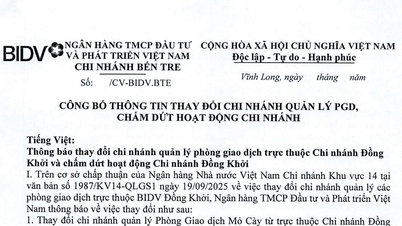Fear hinders innovation
Recently, VCCI has officially commented on the draft Decree detailing a number of articles and guiding the implementation of the Law on Advertising, based on feedback from the business community. VCCI believes that, although sharing the goal of protecting consumers of the drafting agency, many regulations in the draft are interfering too deeply in business activities, with the risk of negatively impacting the entire digital economy .
Article 18 of the draft sets out quite strict regulations for online advertising, such as: ads must be turned off with one click, the maximum waiting time is 5 seconds, and new ads cannot be turned on after the old ads have been turned off.
According to VCCI, this regulation is not suitable for the modern digital business model. In essence, users are using many services (watching movies, reading news, listening to music...) for free, in return, platforms and content creators live off advertising revenue.

VCCI argues that the market has the ability to self-regulate. If ads are annoying, users will leave the platform, directly affecting the revenue of all parties. The State's deep intervention in the duration and form of advertising will hinder innovation and reduce the quality of digital content.
Specifically, VCCI proposed to remove all three of the above regulations. Requiring one-click ad cancellation would limit new forms of interactive advertising, where users can experience the product directly.
The 5-second timeout limit breaks flexible delivery models, potentially causing a constantly interrupted user experience.
The rule of not turning on new ads after they have been turned off is impractical for long-form content such as movies, long videos ... where allocating multiple ad spots is necessary to maintain revenue and production quality.
Concerns about revenue decline
Article 21.3 of the draft requires that specialized advertising screens such as those in elevators and building lobbies must not be installed with devices that collect image and video data of viewers.
VCCI believes that this regulation needs to be seriously reconsidered. Collecting anonymous data such as view counts, estimated age and gender is extremely important for advertisers to measure effectiveness and decide on investment. Without data, they will not be willing to spend money, making this form of advertising less effective.
This will directly impact buildings, as many places are dependent on advertising revenue to maintain operational services such as elevators and security. VCCI also emphasized that the issue of personal data protection has been fully regulated in other laws. Therefore, VCCI proposed to remove this regulation.
The draft also sets out requirements that businesses consider unfeasible. For cosmetics advertising, it requires "clear reading" of warning content on television (TV, video). VCCI believes that this is impossible with very short ads (under 10 seconds) or ads without sound (LCD screens in supermarkets). Allowing warnings to be displayed in writing would be more appropriate and effective.
For food advertising, the name and address of the manufacturer are required. According to VCCI, this regulation is unnecessary because the current law only requires information from the unit responsible for the product. The manufacturer's information is already on the label. Moreover, a product can be produced by many factories, causing great difficulty when designing advertisements.
For the above reasons, VCCI recommends that the drafting agency amend or eliminate these regulations to better suit reality and create conditions for business development.
Source: https://doanhnghiepvn.vn/kinh-te/nhieu-quy-dinh-moi-ve-quang-cao-can-tro-doanh-nghiep-sang-tao/20250812093103607


![[Photo] General Secretary To Lam receives US Ambassador to Vietnam Marc Knapper](https://vphoto.vietnam.vn/thumb/1200x675/vietnam/resource/IMAGE/2025/9/29/c8fd0761aa184da7814aee57d87c49b3)
![[Photo] General Secretary To Lam attends the ceremony to celebrate the 80th anniversary of the post and telecommunications sector and the 66th anniversary of the science and technology sector.](https://vphoto.vietnam.vn/thumb/1200x675/vietnam/resource/IMAGE/2025/9/29/8e86b39b8fe44121a2b14a031f4cef46)

![[Photo] General Secretary To Lam, Secretary of the Central Military Commission attends the 12th Party Congress of the Army](https://vphoto.vietnam.vn/thumb/1200x675/vietnam/resource/IMAGE/2025/9/30/9b63aaa37ddb472ead84e3870a8ae825)
![[Photo] Many streets in Hanoi were flooded due to the effects of storm Bualoi](https://vphoto.vietnam.vn/thumb/1200x675/vietnam/resource/IMAGE/2025/9/29/18b658aa0fa2495c927ade4bbe0096df)































![[Photo] National Assembly Chairman Tran Thanh Man chairs the 8th Conference of full-time National Assembly deputies](https://vphoto.vietnam.vn/thumb/1200x675/vietnam/resource/IMAGE/2025/9/29/2c21459bc38d44ffaacd679ab9a0477c)

































































Comment (0)